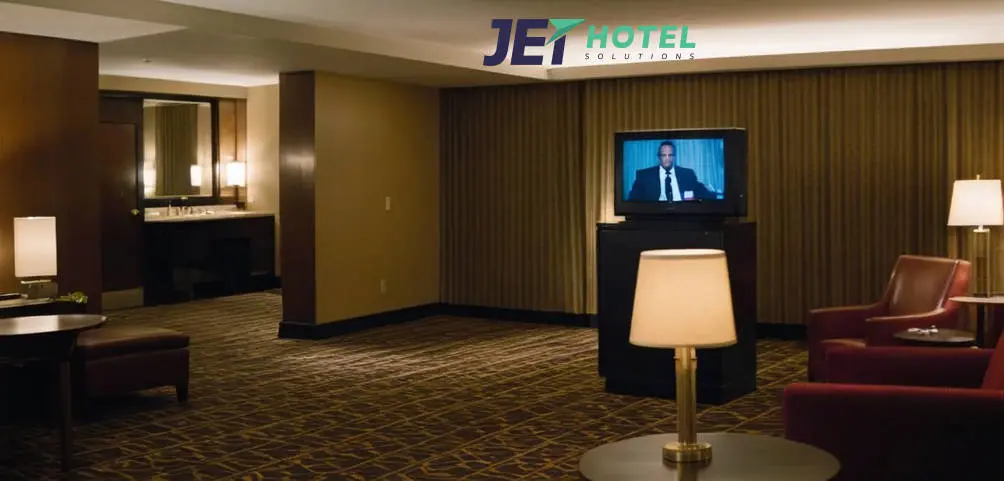Introduction: The Persistent Quirk of Antiquated Hotel Cable Systems
Stepping into a plush hotel room after a long journey can be one of life’s simple pleasures. However, one aspect that frequently dims this experience is the outdated cable TV system that greets many travelers.
At Jet Hotel Solutions (https://www.jethotelsolutions.com/), we’ve prompted to explore why hotels, bastions of hospitality, often lag in this particular area of technology.
Historical Context: The Legacy of Hotel TV Systems
Hotel television systems have a peculiar history. Originally, these systems were designed not just for guest entertainment but also as tools for hotels to promote on-site amenities and services through dedicated channels. The setup of these systems was based on centralized technology, where one main signal was distributed to all TVs in the facility.
This method, while cost-effective in the early days of hotel TV technology, has now become a tether that holds back technological advancement.
Why Hotel TVs Seem Antiquated
One might wonder why hotels, often at the forefront of luxury and convenience in other respects, would allow their television systems to lag. Several factors contribute to this phenomenon:
- High Upgrade Costs: The initial investment required to replace old systems with new, advanced technology is substantial. For a hotel with hundreds of rooms, this expense can run into millions of dollars, a cost that often cannot be justified by the potential returns. Most hoteliers find the prospect of such an upgrade daunting, especially considering the rapid pace of technological obsolescence.
- Logistical Complexity: Hotels are complex operations where every change involves extensive planning and disruption. Upgrading the TV system is not just a matter of plugging in new sets but often requires rewiring, installation of new software, and training for staff on the new systems.
- Economic Decisions: Hotels operate on thin margins where every expense is weighed against its return on investment. Historically, the revenue generated from pay-per-view services and channel-specific advertising has influenced the decision to maintain control over the systems, discouraging open, flexible entertainment systems that cater to modern consumer demands.
Technical Differences and Challenges
The technology behind hotel TVs is markedly different from what we use at home. Hotel television systems, often referred to as ‘headend’ systems, manage content distribution internally to control what channels are offered, including pay-per-view content and promotional channels.

Consumer Expectations vs. Reality
Today’s travelers are more tech-savvy than ever, often carrying multiple devices capable of streaming content. They expect their hotel experience to mirror their home or better, with access to streaming services like Netflix, Hulu, or YouTube.
This mismatch between guest expectations and the reality of hotel TV offerings leads to dissatisfaction, a critical issue for an industry built around guest comfort and satisfaction.
Current Trends and Innovations
Despite these challenges, some forward-thinking hotels are beginning to bridge the gap. For instance, newer hotels have started integrating smart TVs and IPTV (Internet Protocol TV) systems that allow guests to connect their personal devices or access a wider range of digital media. Features such as screen mirroring and direct streaming are becoming more common, reflecting a shift towards more personalized guest experiences.
At Jet Hotel Solutions, we are at the forefront of this transformation, advocating for and implementing systems that not only meet today’s digital demands but are also scalable and future-proof. These innovations not only enhance guest satisfaction but also streamline operations and reduce long-term costs.
Future Outlook: Steering Toward Interactive and Personalized Entertainment
The future of hotel entertainment is likely to be shaped by further personalization and integration of advanced technologies. We anticipate a shift towards more interactive systems that allow guests to choose their entertainment, integrate their own content seamlessly, and enjoy high-definition experiences without the barriers of outdated technology.
Conclusion: Embracing Change for Enhanced Guest Experiences
As we look forward, it’s clear that the path for hotel entertainment systems is veering towards more integration with personal devices and cloud technologies. Hotels that recognize and act on these trends will not only enhance their guest experience but also position themselves competitively in a market that values personalization and technological ease.
We, therefore, continue to explore and implement solutions that anticipate these needs, ensuring that every guest’s stay is as connected and comfortable as they desire. This proactive approach is not just about keeping up with technology—it’s about creating a home away from home.
